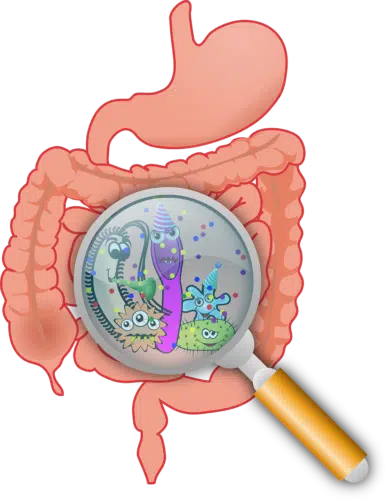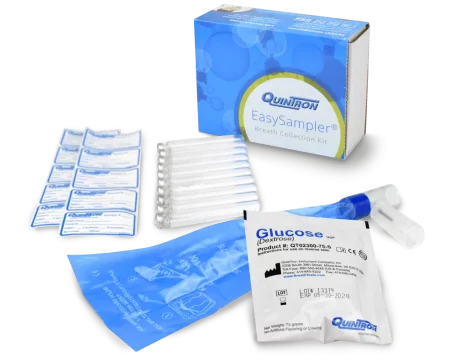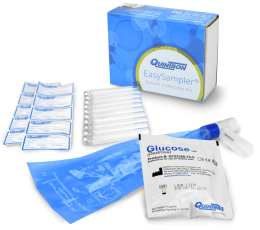
Could you have SIBO? (Small intestinal bacterial overgrowth)
It’s not uncommon for our clients to tell us that they wake up with a flat belly and by the end of the day they look six months pregnant!
If that sounds like you, it won’t surprise you to learn that gas production in those with Small Intestinal Bacterial Overgrowth (SIBO) is about 100 x higher than in people without it.
Even if you haven’t experienced abdominal swelling to such an extreme, any amount of bloating is not normal; it’s actually a sign of intestinal dysfunction. If you’re having gas and/or bloating regularly, or you have food sensitivities you could have SIBO. Or you might have an inability to digest to either fructose (very high in some types of fruit, or sweetners) or lactose (the sugar in milk and milk products) resulting in very similar symptoms.
It is estimated that up to 80% of IBS patients have SIBO, which is usually diagnosed with a breath test.
SIBO is associated with many illnesses in addition to IBS. A breath test can indicate SIBO but does not identify IBS as the associated illness, nor does it identify the root cause.
This post explains more about how a breath test can help understand what is going on with your digestion. Below is a brief overview.
What is SiBO? (and how is it affecting your digestion?)
SIBO occurs when too many bacteria set up camp in the small intestine. This is not an infection of harmful, pathogenic bacteria – rather, SIBO is an overgrowth of normal bacteria, just too many in the wrong place. In some cases, bacteria from the mouth migrate into the small intestine and sometimes probiotic bacteria (from supplements) get “stuck” due to problems with gut motility. But mostly SIBO is bacteria that normally live in the large intestine migrating “northwards” into the small intestine.
In the right place, bacteria are very beneficial. For example, in the large intestine, bacteria produce all kinds of compounds that keep the gut lining healthy, produce some vitamins and aid with the absorption of other compounds. But too many bacteria in the small intestine can be detrimental to your health.

What are the symptoms of SiBO?
SIBO can contribute to, or be responsible for a number of symptoms including:
- Abdominal pain/cramps
- Nausea
- Bloating
- Gas
- Diarrhoea
- Constipation
- Heartburn
- Acid reflux
- Skin issues (rosacea, eczema)
- Food sensitivities, such as fructose intolerance
- Anaemia and malnutrition
- Joint pain
- Fatigue
- Low iron
- Headaches
- Histamine reactions to food
How can SiBO affect my health?
When there are too many bacteria in the small intestine, digestion suffers. That’s because the bacteria break apart sugars and carbohydrates along the lining of the small intestine. As a result, if you have SIBO, you could have problems digesting carbohydrates (bread, pasta, pototoes, possibly fruit, and other sweet things). You may also have deficiencies in some vitamins and other nutrients due to bacteria interfering with absorption or even consuming some of your nutrients for themselves.
SIBO can also cause poor fat absorption. You might have urgent diarrhoea (especially in the morning), fatty stool, or feel nauseated when you eat a high-fat food. Associated with poor fat absorption is deficiencies in vitamins A, E, and K (and sometimes D), as these are all fat-soluble vitamins. You may also have trouble maintaining a healthy body weight.
SIBO damages the tiny hair-like structures (known as villi) that line the intestinal tract – creating a “brush border”. A damaged brush border has a significantly detrimental impact on digestion and absorption of nutrients. This generally leads to food intolerance of greater or lesser degrees.
Low-level inflammation (not a lot – after all, these are normal bacteria) can cause damage to the lining of the small intestine – particularly to a protein called zonulin. Damage to zonulin is a contributing factor to leaky gut or increased intestinal permeability. It is believed that this can trigger a reaction by the immune system to start attacking food particles in the bloodstream as if they were pathogenic toxins. Problems outside the gut such as joint pains, skin problems, headaches and even autoimmune diseases may be consequences.
Other consequences can arise due to overgrowth of bacteria which produce a range of acids. Too many of these acids can result in neurological dysfunction.
How is SiBO diagnosed?
To determine the likelihood that you are affected by SIBO, your health practitioner will gather detailed information about your medical history and symptoms and medical history. Your abdomen will be examined to gauge the severity of gas, bloating, discomfort, or to determine if there might be some other kind of problem. If SiBO is suspected, it is likely that a breath test is recommended. This test accurately measures the concentration of hydrogen and methane in your breath after ingesting a challenge sugar.
The best protocol involves testing with three separate sugars. Each gives different in formation and your practitioner may order all three or a combination of them. The first test is with glucose, followed by fructose, then lactulose. Each test is done on different days, with at least one clear day in between.
If the results are not enlightening, your practitioner may recommend checking for lactose intolerance, or intestinal permeabiltiy. A comprehensive stool microbiome or stool chemistry test may be indicated.
Breath testing can be done in your own home or in our Mt Albert clinic.
Find out more about breath testing here.

Breath testing is done using either glucose, lactulose, or fructose to evaluate where fermentation is occuring. Other sugars, such as sucrose, sorbitol and mannitol, can be tested as well.












